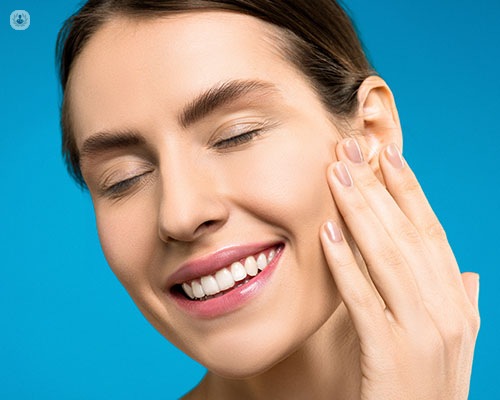Night guard
What is a night guard?
A night guard, also known as a mouth guard or dental split, is a device made of plastic that covers all or part of the teeth. It is typically worn through the night to prevent you from grinding your teeth while you are sleeping.
Generally, soft guards are best avoided. Whilst they stop the teeth meeting, they can actually worsen a patient's teeth grinding. A night guard is often made of dual laminate or plastic whilst an occlusal splint (a much more accurately adjusted appliance) is made from acrylic and more likely to prevent grinding as well as stopping the teeth actually contacting.

Why are they used?
You would be recommended to use a night guard if you are suffering from a condition known as bruxism. Bruxism causes you to grind your teeth or clench your jaw, typically when you are sleeping, although it can happen unconsciously to some people while they are awake and under stress. The main aim of a nightguard is to separate your top and bottom teeth so they don’t damage each other from the pressure of grinding or clenching.
How is the night guard made?
Your dentist makes an impression of your top and bottom teeth. From this, they then make a plaster cast which is sent to a dental laboratory. When you wear your new night guard at night, it should fit perfectly and not cause any pain or discomfort.
How do you clean a night guard?
You can brush the night guard using a toothbrush and toothpaste and then rinse it with warm water. Your dentist may also give you an antimicrobial solution in which you can soak your night guard to remove any foreign organisms.
You should store your night guard in its protective case (which you should also clean) during the day, but you should make sure it has ventilation so it can dry and prevent any regrowth of bacteria.
When should you replace your night guard?
When you receive your new night guard, it will be shiny and smooth. However, after frequent use, it can become rough and as a result can sometimes develop tiny cracks. These tiny cracks are not only good places for bacteria to grow, but they can damage your gums at night and create a place for bacteria to enter your body. It is important to talk to your dentist about replacing your night guard when it starts to show signs of heavy use.
How do I know whether to order an upper or lower custom teeth night guard?
Research that has been recently carried out has revealed that roughly 80 per cent of customers prefer an upper night guard as opposed to a lower one, simply due to comfort of the guard not touching off the tongue. It is a matter of personal preference though, and neither has been shown to be better or more effective than the other.
Can I wear a night guard even if I have missing teeth?
Yes. Even if patients are missing a couple of teeth, they can still wear a night guard.
Can I wear a night guard if I have implants?
Yes. One's dental implants will not be affected if they wear a dental night guard. In fact, it will affect them positively, as the night guard will protect implants from being damaged.
When is it recommended to wear a dental night guard?
It is highly recommended to wear a custom-fitted dental night guard if patients with dental implants suffer from bruxism.







